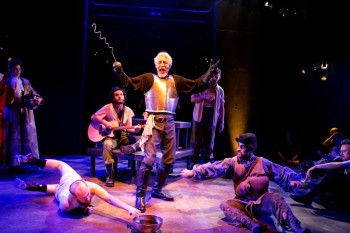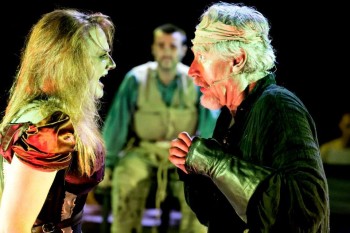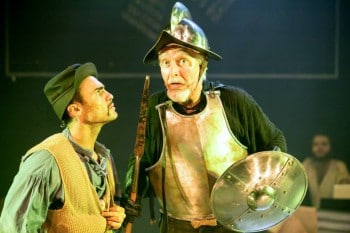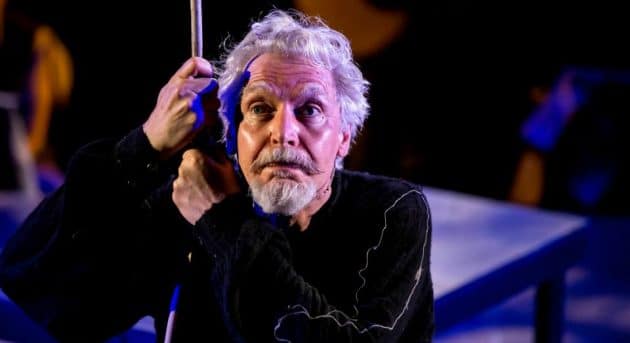Review: Man of La Mancha, Squabbalogic
Squabbalogic are back and this time they’re tackling a revival of a classic work, trying to find its original kernel of authenticity before it became a gaudier, lighter-hearted thing: they’re trying to find the gritty soul in Man of La Mancha.
The Reginald Theatre has been transformed into a gloomy dungeon. Prisoners (the exceptionally talented ensemble cast) are strewn about, coiled and aimless and, largely, disconnected. It’s dark. They’re waiting to face the Spanish Inquisition, and there isn’t a lot of room for light, or hope.

And then two men are thrown into the mix – Miguel de Cervantes (Tony Sheldon), and his sidekick Sancho (Ross Chisari). They dared to foreclose on a church. Promptly put on a mock trial by his fellow prisoners to determine if his manuscript will burn, Cervantes offers in his defense a story: the story of the mad knight Don Quixote, who sees castles instead of inns and beauty in a difficult world, because Don Quixote the knight-errant is really the delusion of an old chivalrous man named Alonso Quijana.
He’s an unbearably bright light in a harsh world, and yet his brightness encourages small flickers of hope in those around him. Not everyone, but it’s enough to light a way through his delusion; it’s enough to lend validity to the Don Quixote myth and escape, at least for a moment or two at a time.
The Innkeeper (Laurence Coy) gives Quixote shelter and gently plays into his delusion. Sancho finds him irresistibly likable, and will follow him wherever he goes. And Aldonza (Marika Aubrey), who has for her whole difficult life refused the concept and touch of beauty into her life, finds herself softening towards the one person who has ever seen good in her – even if it troubles her that he insists on seeing her as the Lady Dulcinea, rather than hard-living prostitute Aldonza.
The score feels organic and charmingly roughshod; various characters play the instruments on stage, creating a warm, jangly, and thoroughly likable musical experience (led by music director Paul Geddes). This is well-balanced with the staging, where characters build whole worlds out of a couple of benches and Cervantes’ trunk of props from his old theatre trade. The design (by Simon Greer) is perfectly Squabbalogic and perfectly Man of La Mancha, and somehow that balance of new boutique theatre meeting an old classic strikes all the right notes; suddenly Man of La Mancha is new again, and increasingly urgent – particularly, poignantly, when the Quixote story is stopped in its tracks when a prisoner is taken and tortured. The real threat to the life and vitality of these prisoners is never far away, and it’s this threat that gives the Don Quixote allegory more weight – and really, it’s Squabbalogic that puts the urgency back into the book, which is weirdly toothless.

This production has flashes of brilliance. Tony Sheldon is masterful, crucially divorced from bombast as Cervantes/Quixote; he sings “The Impossible Dream” as something so honest, heartfelt, small and sure that the song is reinvented on the spot. It’s not a standard striving for big notes and declarations of self-importance. It’s an honest, pure statement of soul and limitations and the limitless heart. It’s gorgeous, and tiny lights scattered like stars light his way, and it’s magical.
Marika Aubrey is a very fine, blazing Aldonza/Dulcinea, and it’s incredibly difficult to watch her suffer extreme violence and violation (the loosely directed ensemble both does and doesn’t feel cruel, and it’s a strange, unsettling vision). But when she sings “Aldonza,” when she unleashes the exact reason why she can’t bear Quixote’s kindness, Aubrey is all pain and anger and sorrow, sharp like a knife to protect her deeply human, dangerously soft heart.
However, from the back of the theatre the lighting in general (by Benjamin Brockman) feels more oppressive than immersive and becomes an obstacle between the audience and the stage; it was easy to feel divorced from many of the larger, full-ensemble experiences because of not quite being able to see, or not feeling invited to see.
And at times the ensemble feels too loosely directed; it’s difficult to watch them all and maybe that’s a small reward rather than a problem; you can find snatches and follow them until another snatches you up, but on opening night it felt a little too loose and close to messy; it lacked a certain tightness that would help propel the busy, scene-changing transitions forward with that right blend of dramatic action and comic relief. It also created some problems with the boisterous muleteers; their mocking “Dulcinea” reprise was excellent, even though it doesn’t even come close to hinting their later savagery – which presents an unevenness in the storytelling that’s more the fault of the book than the production, but was difficult to track, trust and experience authentically.
But there is Richard Woodhouse’s guitar playing and vocal on “Little Bird,” leading the ensemble into something so beautiful that turns so wrong. It’s a gift of a beautiful, sinister moment. And there is Glenn Hill’s Padre, whose gorgeous vocal quality serves “I’m Only Thinking of Him” and “To Each his Dulcinea” beautifully.

And of course so excellent is the ending, which does that particular thing that musicals, when done right, do so well: the quiet goosebump-raising full cast in harmony. The “Impossible Dream” reprise that reminds us that Quixote’s story is, while inspiring and lovely, it’s still just a story from a fictional creation of a fictional man: everyone on that stage is still marked for torture and death.
Director Jay James-Moody has always been good at bringing out the genuine human emotion in a heightened artform like musical theatre, and his work with Sheldon is one of his greatest successes; together they have built a slowly-cresting crescendo of equal parts charm, valour, kindness and tragedy.
At times, Man of La Mancha is messy, and at times it blends itself too much into shadow, and at times significant things feel buried, like Quixote’s battle with The Knight of the Mirrors and the subsequent reveal of the Enchanter’s real identity.
But it’s a fully realised, startlingly sophisticated production of a show that isn’t easy to produce in an authentic way, particularly in the age of commercial mega musicals. It’s incredibly courageous, to take this show and trace it back to its workshopped beginnings, to let cast members play horses and a couple of panels play great moving, varied structures. To remind us that threats of violence and death for being fair and just are incredibly real threats still in 2015. To take a bona fide international stage star and put him on that unworthy scaffold Henry V‘s Chorus talks about, and simply upon our imaginary forces work.
If you’re looking for innovation, invention, and evolution of musical theatre in Sydney, in Australia, anywhere and everywhere: look at Squabbalogic. They’re reaching as high as they can, and higher every time. Man of La Mancha is a show worth a viewing – and maybe even two or three. What an experience. What a treat to be in the audience while a company does something we’ve never really seen here before.



I disagree the show was “messy” on opening night. Rather, I found the direction incredibly precise. Apart from that, I really enjoyed your thorough and well-written review 🙂 We do agree one one thing – this is a stunning production!